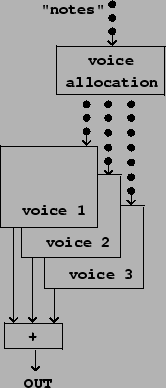 |
It is frequently desirable to automate the selection of voices to associate with individual tasks (such as notes to play). For example, a musician playing at a keyboard can't practically choose which voice should go with each note played. To automate voice selection we need a voice allocation algorithm, to be used as shown in Figure 4.9.
Armed with a suitable voice allocation algorithm, the control source need not concern itself with the detail of which voice is taking care of which task; algorithmic note generators and sequencers frequently rely on this. On the other hand, musical writing for ensembles frequently specifies explicitly which instrument plays which note, so that the notes will connect to each other end-to-end in a desirable way.
One simple voice allocation algorithm works as shown in Figure 4.10. Here we
suppose that the voice bank has only two voices, and we try to allocate voices
for the tasks ![]() ,
, ![]() ,
, ![]() , and
, and ![]() . Things go smoothly until task
. Things go smoothly until task ![]() comes along, but then we see no free voices (they are taken up by
comes along, but then we see no free voices (they are taken up by ![]() and
and ![]() ).
We could now elect either to drop task
).
We could now elect either to drop task ![]() , or else to steal the voice of
either task
, or else to steal the voice of
either task ![]() or
or ![]() . In practice the best choice is usually to steal one.
In this particular example, we chose to steal the voice of the oldest task,
. In practice the best choice is usually to steal one.
In this particular example, we chose to steal the voice of the oldest task,
![]() .
.
If we happen to know the length of the tasks ![]() and
and ![]() at the
outset of task
at the
outset of task ![]() , we may be able to make a better choice of which voice
to steal. In this example it might have been better to steal from
, we may be able to make a better choice of which voice
to steal. In this example it might have been better to steal from ![]() , so
that
, so
that ![]() and
and ![]() would be playing together at the end and not
would be playing together at the end and not ![]() alone.
In some situations this information will be available when the choice must be
made, and in some (live keyboard input, for example) it will not.
alone.
In some situations this information will be available when the choice must be
made, and in some (live keyboard input, for example) it will not.